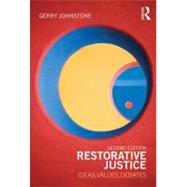
Note: Supplemental materials are not guaranteed with Rental or Used book purchases.
Purchase Benefits
What is included with this book?
| Preface to the second edition | p. ix |
| Preface to the first edition | p. xi |
| Introduction | p. 1 |
| Central themes and critical issues | p. 9 |
| Introduction | p. 9 |
| Core themes | p. 10 |
| Differences which have surfaced in the move from margins to mainstream | p. 13 |
| The claims of restorative justice: a brief examination | p. 18 |
| Some limitations of restorative justice | p. 21 |
| Some dangers of restorative justice | p. 25 |
| Debunking restorative justice | p. 27 |
| Reviving restorative justice traditions | p. 30 |
| The rebirth of an ancient practice | p. 30 |
| Pre-modern criminal justice | p. 31 |
| The renaissance of native justice traditions | p. 35 |
| Navajo peacemaking | p. 37 |
| Can one characterise ancient and indigenous justice as restorative? | p. 39 |
| Can one revive restorative justice traditions? | p. 40 |
| Conclusion: did restorative justice ever die? | p. 48 |
| Healing the victim | p. 51 |
| Introduction | p. 51 |
| The experiences and needs of victims | p. 52 |
| The inadequacy of punitive justice for the victim | p. 55 |
| Victim reforms | p. 58 |
| Restitution from the offender | p. 61 |
| Beyond restitution: restoring victims | p. 62 |
| Restorative justice or 'clubbing together'? | p. 64 |
| Using victims to rehabilitate offenders | p. 67 |
| Paternalism towards victims | p. 68 |
| Balancing the needs of the victim with those of society | p. 69 |
| A restorative approach to offenders | p. 72 |
| Introduction | p. 72 |
| Restorative justice as an alternative to retributive justice | p. 73 |
| Restorative justice as an alternative to treatment | p. 77 |
| The goals and methods of restorative justice in relation to offenders | p. 79 |
| An alternative to punishment or an alternative form of punishment? | p. 88 |
| An alternative to treatment? | p. 92 |
| Shame, apology and forgiveness | p. 94 |
| Introduction | p. 94 |
| Restorative cautioning | p. 95 |
| The psychological routes of restorative conferencing | p. 95 |
| The idea of reintegrative shaming | p. 97 |
| Some questions about shaming | p. 101 |
| Apology and forgiveness | p. 109 |
| Mediation, participation and the role of community | p. 112 |
| Introduction: handling criminal conflicts | p. 112 |
| The rationale for the restorative justice process | p. 115 |
| Achieving restorative goals | p. 116 |
| Moral development and the strengthening of community | p. 118 |
| The role of community | p. 124 |
| The future of restorative justice | p. 133 |
| Introduction | p. 133 |
| Implementing restorative justice: the paths less likely | p. 134 |
| The implementation of restorative techniques | p. 137 |
| Restorative justice and the pattern of penal control | p. 139 |
| The future of restorative justice research | p. 140 |
| The developing character of restorative justice | p. 142 |
| The growth of the campaign for restorative justice | p. 142 |
| The shifting focus of the campaign | p. 143 |
| The meaning of 'restorative justice' | p. 154 |
| Conclusion: restorative justice as a complex set of teachings | p. 157 |
| Appendix: The theological roots of judicial punishment | p. 160 |
| References | p. 163 |
| Index | p. 176 |
| Table of Contents provided by Ingram. All Rights Reserved. |
The New copy of this book will include any supplemental materials advertised. Please check the title of the book to determine if it should include any access cards, study guides, lab manuals, CDs, etc.
The Used, Rental and eBook copies of this book are not guaranteed to include any supplemental materials. Typically, only the book itself is included. This is true even if the title states it includes any access cards, study guides, lab manuals, CDs, etc.